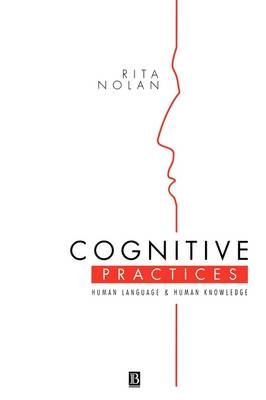
Cognitive Practices
Wiley-Blackwell (Verlag)
978-0-631-18974-9 (ISBN)
How does human language contribute to the cognitive edge humans have over other species? This question eludes most current theories of language and knowledge. Incorporating research results in psychology and cutting a path through a broad range of philosophical debates, Nolan develops a strikingly original account of language acquisition which holds important implications for standard theories of language and the philosophical foundations of cognitive science.
Rita Nolan is Professor of Philosophy at the State University of New York at Stony Brook. She has written on topics in the philosophy of language, social epistemology, and Wittgenstein.
Preface. Introduction.
Part I: Language and Cognitive Dynamics:.
1. The Question.
2. Language Realism.
3. Cognitive Dynamics.
4. Society and Language.
5. Desiderata for a Theory of Language.
6. The Standard Theory.
7. Foci for Revision.
Part II: The Code Metaphor for Languages:.
8. The Semantic Content of the Code Metaphor.
9. Referential Semantics: Breaking the Code?.
10. The New Code Theory.
11. Mature Competency and Language Learning.
Part III: Language Entry:.
12. Linguistic Constructionalism.
13. The Fallacy of Linguistic Supervenience.
14. Semantic Theory and Language Learning.
15. Reconceptualizing Language Acquisition.
16. How Long Does it Take?.
17. Superordination.
18. The Cognitive Import of Superordination.
19. The Categorical Structure of Discourse.
20. Conclusion.
Part IV: Society in Mind:.
21. The Superordination Hypothesis.
22. Unavailable Routes to Language Entry.
23. Two Questions.
24. Interpreting Early Speech.
25. Early Syntax.
26. But What Is Predication?.
Part V: From Response to Assertion:.
27. Is There a Transition from Response to Assertion.
28. Subjects and Predicates.
29. Formal Approaches to Predication.
30. Sensation, Perception, Conception and Judgement.
31. Categories of Perception, Categories of Conception.
32. The Generality Constraint.
33. Developmental Data.
34. From Perceptual Categories to Conceptual Categories.
35. The Emergence of Predication.
36. Some Consequences of "Thick" Superordination.
Part VI: Discursive Practices:.
37. Mutant Predicates.
38. Conceptual Structures.
39. Towards a Topology of Concepts.
40. Conceptual Structures.
41. Meaning as Analogical.
42. Discourse Genres.
43. Non-Gricean Pragmatists.
44. Socially Contingent Phenomena.
45. The Attitudes as Socially Contingent.
46. Substructural Indeterminacy.
References.
Index.
| Verlagsort | Hoboken |
|---|---|
| Sprache | englisch |
| Maße | 159 x 232 mm |
| Gewicht | 255 g |
| Themenwelt | Geisteswissenschaften ► Philosophie ► Sprachphilosophie |
| Geisteswissenschaften ► Psychologie ► Allgemeine Psychologie | |
| Geisteswissenschaften ► Psychologie ► Verhaltenstherapie | |
| Geisteswissenschaften ► Sprach- / Literaturwissenschaft ► Sprachwissenschaft | |
| ISBN-10 | 0-631-18974-2 / 0631189742 |
| ISBN-13 | 978-0-631-18974-9 / 9780631189749 |
| Zustand | Neuware |
| Haben Sie eine Frage zum Produkt? |
aus dem Bereich


